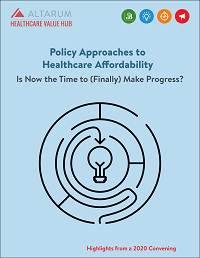| Summary and Resources: |
Polling data repeatedly shows that healthcare affordability is the number one issue that people, on both sides of the political aisle, want elected officials to address. Until recently, however, policymakers lacked a clearly defined menu of policy options to inform legislative change. Efforts to make healthcare “affordable” are further complicated by a lack of agreement about how healthcare affordability should be measured.
As our expert panels discussed, a flurry of reports and state activity suggests that we are finally seeing increased attention to this critical issue.
Panel 1: State and Federal Affordability Policies, moderated by Joanne Kenen – Politico
- Jen Mishory, Senior Fellow at The Century Foundation, described the foundation’s recent report examining federal and state options to address the “premium affordability gap” for those purchasing coverage in the non-group market, including reinsurance, expanding marketplace subsidies and benchmarking rates to Medicare.
- Lynn Quincy, Director of the Healthcare Value Hub, outlined the four-part framework for addressing healthcare affordability used by its new Healthcare Affordability State Scorecard, including:
- Extending affordable coverage to all residents;
- Making cost-sharing affordable and evidence-based;
- Reducing the provision of low- and no-value care; and
- Curbing excess healthcare prices.
- Roslyn Murray, Consultant for Catalyst for Payment Reform, provided a deep dive into the role of prices in driving up healthcare costs for state residents. She identified state strategies to address high prices that result from provider consolidation in particular, referencing a new report from the Urban Institute.
All panelists identified state-specific examples of affordability policies currently being enacted, including:
- Insurance commissioners’ ability to reject proposed health insurance premiums deemed “unaffordable” in Colorado and Rhode Island;
- Price ceilings in Oregon and Montana’s state employee benefit contracts; and;
- Colorado’s latest effort to offer a public option that limits hospital prices.
Panel 2: Affordability Standards to Measure Success, also moderated by Joanne Kenen – Politico
This panel discussed current efforts to measure healthcare affordability, which is vital to realizing state and federal policy goals. Panelists noted that, while imperfect, existing standards such as the Federal Poverty Level provide a benchmark for policymakers and help measure policies’ effectiveness.
- Liz Hagan, Senior Policy Manager for US of Care, kicked things off by explaining that there is more than one way to define healthcare affordability, although some approaches (like standards that only consider the cost of insurance premiums) are clearly insufficient.
- Janet Weiner, Co-Director for Health Policy at the Leonard Davis Institute of Health Economics (LDI), noted how the tax-exclusion for employer-provided coverage causes low income workers to pay significantly more for the same coverage than their higher-income colleagues. She reviewed other key ideas from the LDI’s brief on affordability concepts.
- Vicki Veltri, Executive Director of Connecticut’s Office of Health Strategy, described her office’s comprehensive approach to looking at healthcare affordability in the context of real life. Connecticut’s effort to create an affordability standard that reflects the many factors that determine a family’s ability to afford healthcare—not only income but family size, other financial obligations, and health status.
To close out this panel, Moderator Kenen asked the crucial question: once these affordability standards are created, how does society pay for subsidies needed to provide healthcare at those levels?
The event concluded with moderator Joanne Kenen sharing her overarching thoughts about the discussion, prompted by Andrea Ducas, Senior Program Officer at the Robert Wood Johnson Foundation.
A recording of the event can be accessed here.
|











